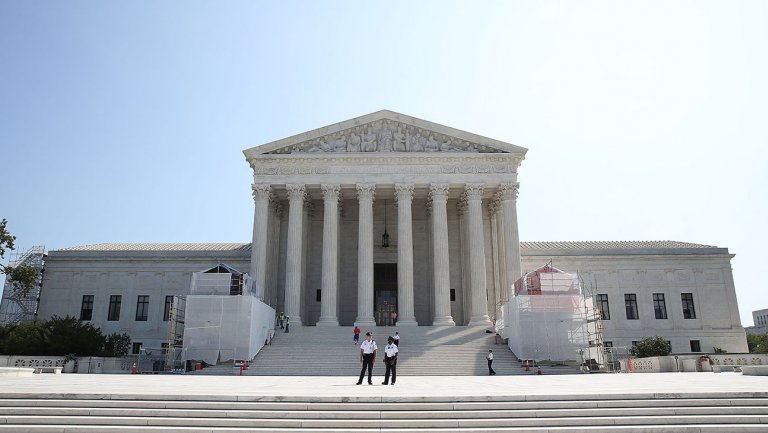Those of fiendish or mischievous mind will have an easier time registering trademarks after the Supreme Court on Monday decided to reject as unconstitutional a rule against disparaging ones. The high court's decision, authored by justice Samuel Alito, holds that a Lanham Act provision against such offensive trademarks is facially invalid under the First Amendment.
"It offends a bedrock First Amendment principle," writes Alito in the opinion. "Speech may not be banned on the ground that it expresses ideas that offend."
The free speech victory goes to Simon Tam, the Asian-American frontman for The Slants who attempted to register his rock band's name. He says he picked his band's moniker in an effort to reclaim a stereotype. After trademark examiners refused Tam's application, Tam brought a lawsuit, and in December 2015, he prevailed at the United States Court of Appeals for the Federal Circuit.
The Supreme Court has now affirmed the lower appeals court's opinion, which is also potentially welcome news for the NFL's Washington Redskins, whose own marks were canceled for being disparaging to Native Americans. Thanks to the development at the high court, entertainment companies can feel more comfortable picking scandalous titles with knowledge they'll be able to register trademarks to protect associated merchandise.
Today's decision also has the potential of alleviating a great amount of confusion as the U.S. Patent and Trademark Office's response to offensive marks hasn't been particularly consistent over the years. For example, N.W.A the rap group also known as Niggaz Wit Attitudes was able to register while actor Damon Wayans couldn't obtain "Nigga" for clothing. Bravo's Queer Eye for the Straight Guy and Channel Four's Queer as Folk were fine, but not the registration from a group of lesbians who wished to sell videos of a "Dykes on Bikes" parade. Alito notes in his opinion that the "vagueness of the disparagement test and the huge volume of applications has produced a haphazard record of enforcement."
Alito acknowledges that even without registration, a trademark a word or phrase that serves to identify the source of one's goods or services may still be used in commerce and enforced under state common law. But he adds that registration confers important benefits including notice to others, prima facie evidence of validity, and potential incontestability.
The justice writes that a government entity often takes viewpoints when embarking on a course of action, and that free speech doesn't necessarily require "viewpoint neutrality."
"But while the government-speech doctrine is important indeed essential it is a doctrine that is susceptible to dangerous misuse," he adds. "If private speech could be passed off as government speech by simply affixing a government seal of approval, government could silence or muffle the expression of disfavored viewpoints. For this reason, we must exercise great caution before extending our government-speech precedents."
Alito goes on to reject the government's contention that trademarks represent in any way the government's viewpoint. He ridicules the notion that stamping approval means expressing speech.
"For example, if trademarks represent government speech, what does the Government have in mind when it advises Americans to 'make.believe' (Sony), 'Think different' (Apple), 'Just do it' (Nike), or 'Have it your way' (Burger King)?" he asks. "Was the Government warning about a coming disaster when it registered the mark 'EndTime Ministries'?"
He adds that when it comes to the registration of copyright a different form of intellectual property that covers original authorship accepting the government's arguments about being forced into distasteful speech has worrisome implications.
"The Government attempts to distinguish copyright on the ground that it is the 'engine of free expression, but as this case illustrates, trademarks often have an expressive content," he writes. "Companies spend huge amounts to create and publicize trademarks that convey a message. It is true that the necessary brevity of trademarks limits what they can say. But powerful messages can sometimes be conveyed in just a few words. Trademarks are private, not government, speech."
After shooting down the government's argument in this regard, and another on why the government shouldn't be forced to subsidize offending commercial speech, Alito comes to an analysis on whether the Lanham Act's disparagement clause is narrowly drawn to withstand constitutional scrutiny. He concludes the clause is "far too broad," potentially interfering with those who might wish to register "Down with racists" and "Down with sexists," as examples.
"There is also a deeper problem with the argument that commercial speech may be cleansed of any expression likely to cause offense," he notes. "The commercial market is well stocked with merchandise that disparages prominent figures and groups, and the line between commercial and non-commercial speech is not always clear, as this case illustrates. If affixing the commercial label permits the suppression of any speech that may lead to political or social 'volatility,' free speech would be endangered."
All of the justices except Neil Gorsuch, who wasn't yet on the Supreme Court when the hearing was held and thus didn't participate agreed with the main finding in the case.
In a concurring opinion, four of the justices led by Anthony Kennedy write that the ban on disparaging trademarks is "viewpoint discrimination" on the part of the government, but with perhaps an eye to ensuring that other grounds for refusing trademarks confusion or dilution, for instance don't fall by the wayside, they attempt to distinguish the Tam case and even the similar dispute concerning the Washington Redskins. Ultimately, however, the sentiment is similar that the government must be careful about interfering with free speech.
"A law that can be directed against speech found offensive to some portion of the public can be turned against minority and dissenting views to the detriment of all," writes Kennedy. "The First Amendment does not entrust that power to the governments benevolence. Instead, our reliance must be on the substantial safeguards of free and open discussion in a democratic society."
